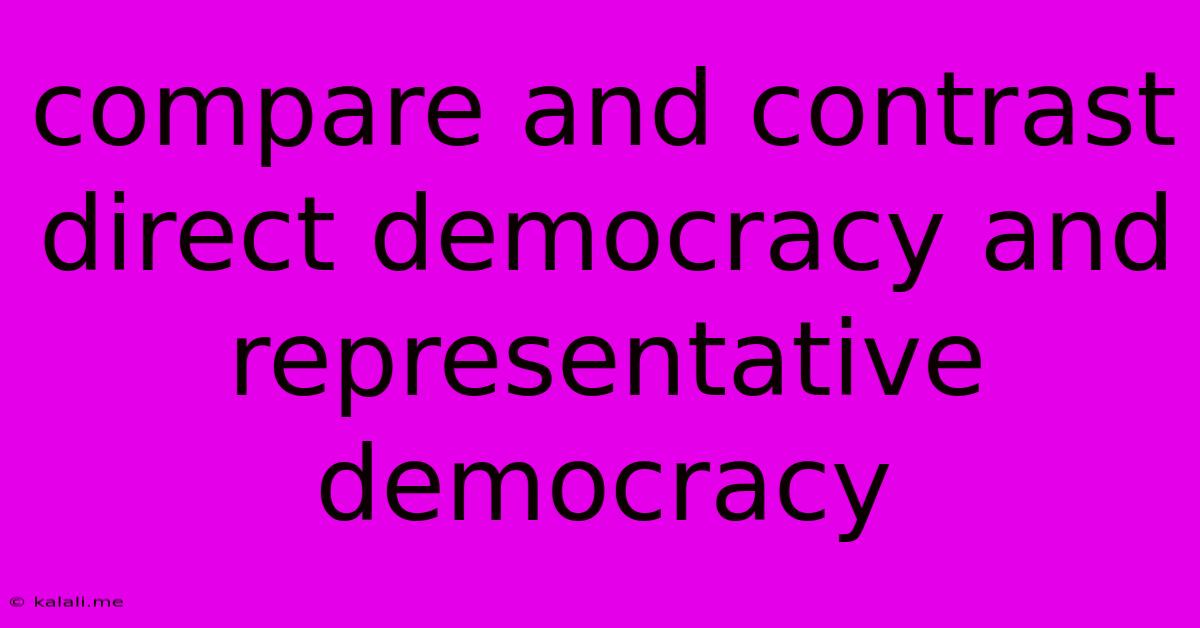Compare And Contrast Direct Democracy And Representative Democracy
Kalali
Jun 14, 2025 · 3 min read

Table of Contents
Direct Democracy vs. Representative Democracy: A Comparative Analysis
Direct democracy and representative democracy are two fundamental forms of government, both aiming to empower the citizenry but differing significantly in their approach. This article will delve into a detailed comparison and contrast of these systems, exploring their strengths, weaknesses, and practical applications. Understanding these differences is crucial for evaluating the effectiveness and suitability of various governmental structures.
What is Direct Democracy?
Direct democracy, also known as pure democracy, is a system where citizens directly participate in decision-making processes. This participation can take various forms, including referendums, initiatives, and citizens' assemblies. In a direct democracy, the people themselves vote on laws and policies, bypassing any intermediary representatives. Ancient Athens is often cited as a historical example, although its scope and inclusivity were limited by its time. Modern examples, though often limited in scope, exist in some Swiss cantons and at the local level in some US states through initiatives and referendums.
Advantages of Direct Democracy:
- Increased Citizen Engagement: Direct participation fosters a stronger sense of civic duty and ownership of government decisions.
- Enhanced Accountability: Government officials are directly accountable to the people, limiting potential for corruption and abuse of power.
- More Responsive Policies: Policies directly reflect the will of the people, leading to potentially more effective and relevant legislation.
- Greater Political Equality: Every citizen has an equal voice in shaping public policy.
Disadvantages of Direct Democracy:
- Impracticality at Large Scale: Direct democracy becomes incredibly difficult to manage in large populations. The logistical challenges of organizing and conducting votes on every issue are immense.
- Susceptibility to Mob Rule: The potential for passionate minorities or uninformed majorities to make ill-advised decisions is a significant concern.
- Tyranny of the Majority: The rights and interests of minority groups can easily be overlooked or even suppressed.
- Time-Consuming: The process of reaching consensus and making decisions can be extremely time-consuming, hindering efficiency.
What is Representative Democracy?
Representative democracy, also known as indirect democracy or republicanism, is a system where citizens elect representatives to make decisions on their behalf. These representatives, typically members of a parliament or congress, form a government and create laws and policies. The people retain ultimate sovereignty, but their power is exercised indirectly through the elected officials. Most modern democracies operate under this system.
Advantages of Representative Democracy:
- Scalability and Efficiency: Representative democracy can effectively govern large populations and complex issues more efficiently than direct democracy.
- Specialized Expertise: Elected representatives are often more informed on complex policy matters, allowing for more considered and nuanced decision-making.
- Protection of Minority Rights: Representative systems typically include mechanisms like constitutional protections and checks and balances to safeguard the interests of minorities.
- Professional Governance: Delegating governance to professionals allows for more consistent and stable policy implementation.
Disadvantages of Representative Democracy:
- Reduced Citizen Participation: The indirect nature of the system can lead to lower levels of citizen engagement and a sense of detachment from government.
- Potential for Corruption and Elitism: Representatives may act in their own self-interest or become disconnected from the needs of their constituents.
- Limited Accountability: Holding representatives accountable can be challenging, particularly in large and complex political systems.
- Bureaucracy and Inefficiency: The processes of government can become slow, cumbersome, and inefficient due to bureaucracy.
Similarities between Direct and Representative Democracy:
Both systems aim to give the people a voice in government. Both fundamentally rest on the principles of popular sovereignty and consent of the governed. Both strive for a government that is responsive to the needs and desires of its citizens.
Conclusion:
Direct and representative democracies offer distinct approaches to governance, each with its own set of advantages and disadvantages. The choice between these systems is often a pragmatic one, influenced by factors like population size, cultural context, and technological capabilities. Many modern democracies employ a hybrid model, combining elements of both direct and representative democracy to leverage the strengths of each while mitigating their weaknesses. Understanding the nuances of each system is crucial for informed citizenship and responsible participation in the political process.
Latest Posts
Latest Posts
-
Built In Potential Of Pn Junction
Jun 15, 2025
-
Mechanisms Of Social Control In Sociology
Jun 15, 2025
-
Charge On Alpha Particle In Coulombs
Jun 15, 2025
-
Least Common Multiple Of 8 And 28
Jun 15, 2025
-
How Many Valence Electrons Does An Oxygen Atom Have
Jun 15, 2025
Related Post
Thank you for visiting our website which covers about Compare And Contrast Direct Democracy And Representative Democracy . We hope the information provided has been useful to you. Feel free to contact us if you have any questions or need further assistance. See you next time and don't miss to bookmark.